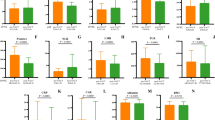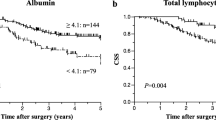Abstract
Objective
In this study, we analyzed the correlation between the preoperative plasma lycopene levels, postoperative adverse complications of chemoradiotherapy, and nutritional risk scores in patients with laryngeal carcinoma.
Methods
A total of 114 patients with laryngeal carcinoma and 114 healthy respondents were enrolled in this study. The patients with laryngeal carcinoma were divided into two groups: 62 patients with laryngeal carcinoma, with an NRS2002 score higher than 3 points and whose diet contained lycopene, were enrolled in the observation group, and 52 patients with laryngeal carcinoma during the corresponding time period, whose diet did not contain lycopene, were enrolled in the reference group. The immune indexes (CD4 + , CD8 + , IGA, IGM, IGG), nutritional indexes (albumin, prealbumin, transferrin), and postoperative adverse complications of chemo-radiotherapy in the two groups were recorded.
Results
The lycopene levels were lower in patients with advanced tumor stage (III and IV). The diagnosis threshold of the plasma lycopene level for laryngeal carcinoma was 0.503 μmol/L. The area under the curve for plasma lycopene levels in cancer diagnosis was 0.96, with a clinical specificity of 0.943 and a sensitivity of 0.859. There was a significant negative correlation between the plasma lycopene levels and Nutrition Risk Screening (NRS) 2002 score (R2 = − 0.523, P < 0.001), which was related to the increase in NRS-2002 scores and nutritional hazards in patients with laryngeal carcinoma. The observation group showed a significant increase in nutritional and immune indices, as compared to the reference group, as well as a lower incidence of severe and serious adverse reactions to chemo-radiotherapy. Lycopene supplementation, tumor stage, NRS-2002 scores, nutritional and immune indices were all significant predictors of postoperative severe and serious adverse complications of chemoradiotherapy.
Conclusion
Progression of laryngeal carcinoma and severity of the side effects of the adverse complications of chemo-radiotherapy are related to the levels of lycopene.




Similar content being viewed by others
Availability of data and materials
All data generated or analyzed during this study are included in this article. Further enquiries can be directed to the corresponding author.
References
Li W, Ma SS, Chen XP (2023) Impact of viral infections on anti-tumor treatment and antiviral strategies in cancer patients. Chin J Cancer Prev Treat 15(01):85–91
Hessels AC, Langendijk JA, Gawryszuk A et al (2022) Late toxicity of abdominal and pelvic radiotherapy for childhood cancer. Radiother Oncol 170:27–36
De Francia S, Mancardi D, Berchialla P et al (2022) Gender-specific side effects of chemotherapy in pancreatic cancer patients. Can J Physiol Pharmacol 100(4):371–377
Khan UM, Butt MS, Niaz RS et al (2021) Lycopene: food sources, biological activities, and human health benefits. Oxid Med Cell Longev 2021:2713511
Amorim ADGN, Fontoura LSDFDLCGP et al (2022) Bio-availability, anticancer potential, and chemical data of lycopene: an overview and technological prospecting. Antioxidants (Basel) 11(2):360
Hao X, Bu W, Lv G et al (2022) Disrupted mitochondrial homeostasis coupled with mitotic arrest generates antineoplastic oxidative stress. Oncogene 41(3):427–443. https://doi.org/10.1038/s41388-021-02105-9
Hahn AW et al (2021) Obesity is associated with lower tumor oxidative phosphorylation (OXPhos) in metastatic melanoma (MM). Cancer Res 81(13):LB208
Ozkan G, Günal-Köroğlu D, Karadag A et al (2023) A mechanistic updated overview on lycopene as potential anticancer agent. Biomed Pharmacother 161:114428. https://doi.org/10.1016/j.biopha.2023.114428
Moran NE, Thomas-Ahner JM, Wan L, Zuniga KE, Erdman JW, Clinton SK (2022) Tomatoes, lycopene, and prostate cancer: what have we learned from experimental models? J Nutr 152(6):1381–1403. https://doi.org/10.1093/jn/nxac066
Puah BP, Jalil J, Attiq A, Kamisah Y (2021) New insights into molecular mechanism behind anti-cancer activities of lycopene. Molecules 26(13):3888. https://doi.org/10.3390/molecules26133888
Zhang Y, Zhang J, Zhu L et al (2023) A narrative review of nutritional therapy for gastrointestinal cancer patients underwent surgery. J Invest Surg 36(1):2150337. https://doi.org/10.1080/08941939.2022.2150337
Huang CX, Xu T, Huang CZ et al (2021) Changes and significance of peripheral blood PD-1 and related immune markers in nasopharyngeal carcinoma patients during radiochemotherapy. Chin J Cancer Biother 28(12):1201–1206
Xu R, Chen XD, Ding Z (2022) Perioperative nutrition management for gastric cancer. Nutrition 93:111492
Shen Y, Zhou Y, He T et al (2021) Effect of preoperative nutritional risk screening and enteral nutrition support in accelerated recovery after resection for esophageal cancer. Nutr Cancer 73(4):596–601
Clinton SK, Giovannucci EL, Hursting SD et al (2020) The World Cancer Research Fund/American Institute for Cancer Research third expert report on diet, nutrition, physical activity, and cancer: impact and future directions. J Nutr 150(4):663–671
Cai LJ, He YK, Huang H (2022) Effect and mechanism of lycopene on regulating the PI3K/AKT pathway to inhibit epithelial-mesenchymal transition in ovarian cancer cells. Zhong Yao Cai 08:1943–1948 (In Chinese)
Zhu YC, Zhou XC (2022) Study on the regulation of lycopene on breast cancer stem cell characteristics and chemotherapy sensitivity through ROS/NF-κB pathway. Zhongguo Xian Dai Ying Yong Yao Xue 39(06):725–729 (In Chinese)
Elias MB, Teodoro AJ, Lemos FS et al (2022) Lycopene induces bone marrow lymphopoiesis and differentiation of peritoneal IgA-producing cells. An Acad Bras Cienc 94(suppl 3):e20210002
Zhang J, Wang P, Xu F et al (2020) Protective effects of lycopene against AFB1-induced erythrocyte dysfunction and oxidative stress in mice. Res Vet Sci 129:103–108
Chinese Anticancer Association Nutritional Professional Committee, Chinese Medical Association Parenteral and Enteral Nutrition Association (2021) Expert consensus on nutritional therapy for patients with prostate cancer. Zhong Liu Dai Xie Yong Yu Ying Xue Dian Zi Zazhi 8(5):503–507
Aprile G, Basile D, Giaretta R et al (2021) The clinical value of nutritional care before and during active cancer treatment. Nutrients 13(4):1196
Greathouse KL, Wyatt M, Johnson AJ et al (2022) Diet-microbiome interactions in cancer treatment: Opportunities and challenges for precision nutrition in cancer. Neoplasia 29:100800
Cao Y, Han D, Zhou X et al (2022) Effects of preoperative nutrition on postoperative outcomes in esophageal cancer: a systematic review and meta-analysis. Dis Esophagus 35(3):028
Acknowledgements
We are particularly grateful to all the people who have given us help on our article.
Funding
Research on the Application of Bundled Care in Airway Management after Tracheostomy. Project Source: Key Project of Medical Science Research in Hebei Province (Project Number: 20180102).
Author information
Authors and Affiliations
Corresponding author
Ethics declarations
Conflict of interest
The authors declare that they have no competing interests.
Ethical approval and consent to participate
The study was conducted in accordance with the Declaration of Helsinki. The study was approved by Ethics Committee of the Hebei General Hospital (No. 2017-56). Written informed consent was obtained from all participants.
Additional information
Publisher's Note
Springer Nature remains neutral with regard to jurisdictional claims in published maps and institutional affiliations.
Rights and permissions
Springer Nature or its licensor (e.g. a society or other partner) holds exclusive rights to this article under a publishing agreement with the author(s) or other rightsholder(s); author self-archiving of the accepted manuscript version of this article is solely governed by the terms of such publishing agreement and applicable law.
About this article
Cite this article
Wang, C., Wang, K., Chen, Y. et al. Correlation between plasma lycopene levels in patients with laryngeal carcinoma and postoperative adverse complications of chemoradiotherapy and nutritional risks. Eur Arch Otorhinolaryngol 281, 1417–1424 (2024). https://doi.org/10.1007/s00405-023-08399-7
Received:
Accepted:
Published:
Issue Date:
DOI: https://doi.org/10.1007/s00405-023-08399-7




